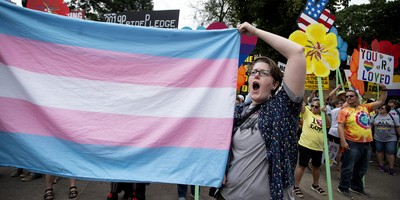Ever since the passage of the 19th Amendment permitted women suffrage, feminists have anticipated a sea change in our politics. When the women's movement of the 1960s and 1970s cut its vast swath through our consciousness, its leaders felt sure that the time for women power had come.
But the results have always fallen far short of the expectations. While women have gained in influence and risen in rank, they are still only 18 percent of the House of Representatives and 17 percent of the Senate. While the gender gap has helped elect Democrats throughout the nation, there has never been the gender revolution predicted by feminists. Until today.

The primaries of June 8, 2010, were historic in that they represented a sweep by women in states as diverse as California, Nevada, Arkansas and South Carolina. The feminists of the '60s would be upset that most of the candidates nominated in this landslide were Republican and pro-life, but the upsurge of women cannot be denied.
Why is it happening?
A clue might come from some polling we did for Hillary in 1990 that sought to assess how women would fare in bids for elective office. We found that the analogy between black and female candidates was fundamentally flawed. When voters contemplated an African-American candidate, they reacted in one of three ways: They either were racist and voted against him, or they were black themselves and supported him, or they were not in either category and considered him on his merits.
But when it comes to women candidates, a totally different calculus is involved. Most voters are neither so feminist that they would automatically back a woman or so sexist that they would never do so. But all voters shared a common stereotype about female candidates that influenced how they voted on them.
Recommended
Whether the voters were male or female, pro-life or pro-choice, supportive of the Equal Rights Amendment or opposed, they had the same predisposition to see women as better than men at certain tasks and less able to perform others.
Asked who they would trust more to win a war, all voters of both genders said they would opt for a male candidate. Who did they think would be more honest and less corrupt? All chose the hypothetical female candidate. Men were better at defense, battling terrorism and fighting crime. Women were preferred for educating children, fighting poverty, restoring integrity to government and protecting the environment. They were equal on the economy and creating jobs.
What was odd about the poll results was that even the most sexist of men -- anti-ERA and pro-life -- gave women the edge in these categories. And the most feminist of women -- pro-ERA and pro-choice -- accorded men the advantage in the remaining areas.
So the question of whether a man or a woman has an advantage relates less to the candidate than to the nature of the times. In 2004, when we were in the midst of our recovery from 9-11, we wanted men. In 2010, when we are sickened by the stench of wheeling and dealing in Congress and the obvious corruption of the process, we are turning toward women.
While conservatives rail at Obama's socialist policies and his health care legislation, most voters of any ideological stripe are revolted by the insight into the legislative process we have all been afforded. We have watched, in Bismark's words, "a sausage being made and a law being passed" and are turned off by the sight.
The efforts to buy off candidates who were seeking the Senate seats from Pennsylvania and Colorado, the deals to get the votes of swing senators in Nebraska and Louisiana for health care, and the ethical lapses of Democratic congressmen like Charlie Rangel have kindled the deepest form of revulsion among ordinary voters.
This disgust showed itself to be universal and powerful in the way it impelled the nomination of women throughout the nation on June 8, 2010.

























Join the conversation as a VIP Member